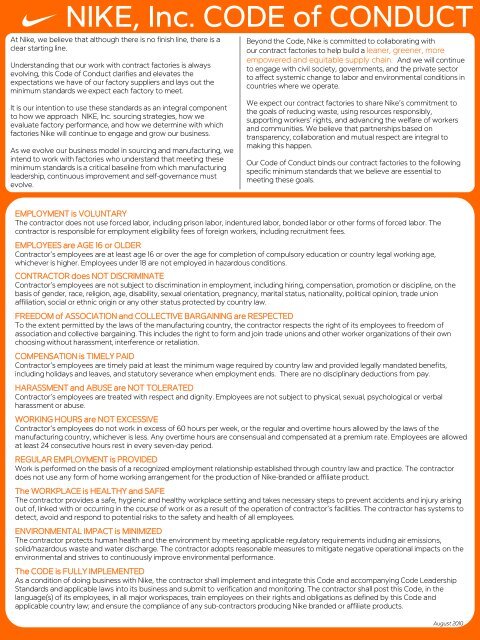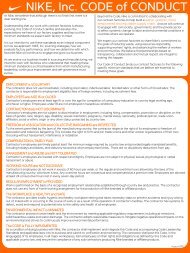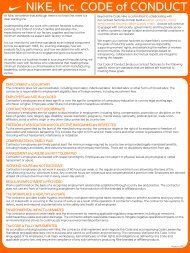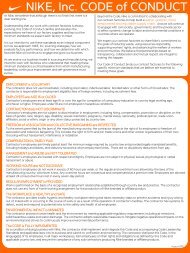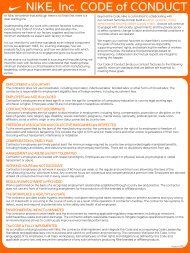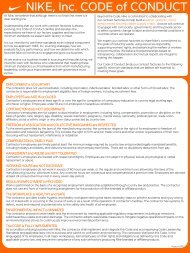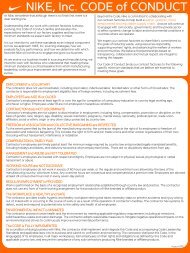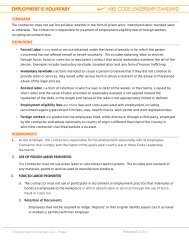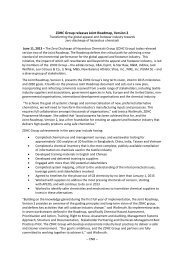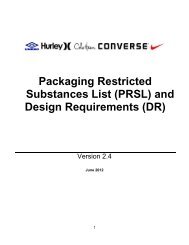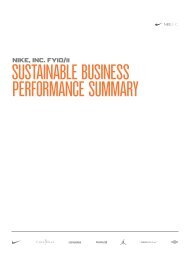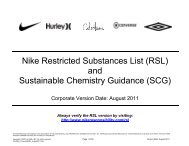COC CLS - Employment is Voluntary - NIKE, Inc. - The Journey
COC CLS - Employment is Voluntary - NIKE, Inc. - The Journey
COC CLS - Employment is Voluntary - NIKE, Inc. - The Journey
You also want an ePaper? Increase the reach of your titles
YUMPU automatically turns print PDFs into web optimized ePapers that Google loves.
S <strong>NIKE</strong>, <strong>Inc</strong>. CODE of CONDUCTAt Nike, we believe that although there <strong>is</strong> no fin<strong>is</strong>h line, there <strong>is</strong> aclear starting line.Understanding that our work with contract factories <strong>is</strong> alwaysevolving, th<strong>is</strong> Code of Conduct clarifies and elevates theexpectations we have of our factory suppliers and lays out theminimum standards we expect each factory to meet.It <strong>is</strong> our intention to use these standards as an integral componentto how we approach <strong>NIKE</strong>, <strong>Inc</strong>. sourcing strategies, how weevaluate factory performance, and how we determine with whichfactories Nike will continue to engage and grow our business.As we evolve our business model in sourcing and manufacturing, weintend to work with factories who understand that meeting theseminimum standards <strong>is</strong> a critical baseline from which manufacturingleadership, continuous improvement and self-governance mustevolve.Beyond the Code, Nike <strong>is</strong> committed to collaborating withour contract factories to help build a leaner, greener, moreempowered and equitable supply chain. And we will continueto engage with civil society, governments, and the private sectorto affect systemic change to labor and environmental conditions incountries where we operate.We expect our contract factories to share Nike’s commitment tothe goals of reducing waste, using resources responsibly,supporting workers’ rights, and advancing the welfare of workersand communities. We believe that partnerships based ontransparency, collaboration and mutual respect are integral tomaking th<strong>is</strong> happen.Our Code of Conduct binds our contract factories to the followingspecific minimum standards that we believe are essential tomeeting these goals.EMPLOYMENT <strong>is</strong> VOLUNTARY<strong>The</strong> contractor does not use forced labor, including pr<strong>is</strong>on labor, indentured labor, bonded labor or other forms of forced labor. <strong>The</strong>contractor <strong>is</strong> responsible for employment eligibility fees of foreign workers, including recruitment fees.EMPLOYEES are AGE 16 or OLDERContractor’s employees are at least age 16 or over the age for completion of compulsory education or country legal working age,whichever <strong>is</strong> higher. Employees under 18 are not employed in hazardous conditions.CONTRACTOR does NOT DISCRIMINATEContractor’s employees are not subject to d<strong>is</strong>crimination in employment, including hiring, compensation, promotion or d<strong>is</strong>cipline, on thebas<strong>is</strong> of gender, race, religion, age, d<strong>is</strong>ability, sexual orientation, pregnancy, marital status, nationality, political opinion, trade unionaffiliation, social or ethnic origin or any other status protected by country law.FREEDOM of ASSOCIATION and COLLECTIVE BARGAINING are RESPECTEDTo the extent permitted by the laws of the manufacturing country, the contractor respects the right of its employees to freedom ofassociation and collective bargaining. Th<strong>is</strong> includes the right to form and join trade unions and other worker organizations of their ownchoosing without harassment, interference or retaliation.COMPENSATION <strong>is</strong> TIMELY PAIDContractor’s employees are timely paid at least the minimum wage required by country law and provided legally mandated benefits,including holidays and leaves, and statutory severance when employment ends. <strong>The</strong>re are no d<strong>is</strong>ciplinary deductions from pay.HARASSMENT and ABUSE are NOT TOLERATEDContractor’s employees are treated with respect and dignity. Employees are not subject to physical, sexual, psychological or verbalharassment or abuse.WORKING HOURS are NOT EXCESSIVEContractor’s employees do not work in excess of 60 hours per week, or the regular and overtime hours allowed by the laws of themanufacturing country, whichever <strong>is</strong> less. Any overtime hours are consensual and compensated at a premium rate. Employees are allowedat least 24 consecutive hours rest in every seven-day period.REGULAR EMPLOYMENT <strong>is</strong> PROVIDEDWork <strong>is</strong> performed on the bas<strong>is</strong> of a recognized employment relationship establ<strong>is</strong>hed through country law and practice. <strong>The</strong> contractordoes not use any form of home working arrangement for the production of Nike-branded or affiliate product.<strong>The</strong> WORKPLACE <strong>is</strong> HEALTHY and SAFE<strong>The</strong> contractor provides a safe, hygienic and healthy workplace setting and takes necessary steps to prevent accidents and injury ar<strong>is</strong>ingout of, linked with or occurring in the course of work or as a result of the operation of contractor’s facilities. <strong>The</strong> contractor has systems todetect, avoid and respond to potential r<strong>is</strong>ks to the safety and health of all employees.ENVIRONMENTAL IMPACT <strong>is</strong> MINIMIZED<strong>The</strong> contractor protects human health and the environment by meeting applicable regulatory requirements including air em<strong>is</strong>sions,solid/hazardous waste and water d<strong>is</strong>charge. <strong>The</strong> contractor adopts reasonable measures to mitigate negative operational impacts on theenvironmental and strives to continuously improve environmental performance.<strong>The</strong> CODE <strong>is</strong> FULLY IMPLEMENTEDAs a condition of doing business with Nike, the contractor shall implement and integrate th<strong>is</strong> Code and accompanying Code LeadershipStandards and applicable laws into its business and submit to verification and monitoring. <strong>The</strong> contractor shall post th<strong>is</strong> Code, in thelanguage(s) of its employees, in all major workspaces, train employees on their rights and obligations as defined by th<strong>is</strong> Code andapplicable country law; and ensure the compliance of any sub-contractors producing Nike branded or affiliate products.August 2010
EMPLOYMENT IS VOLUNTARYd. Payment of <strong>Employment</strong> Eligibility Feesi. Except as provided below, directly pay all legally allowed employment eligibility fees associatedwith employment (either by the sending or receiving country), including recruitment or placementagency fees as a cost of doing business. Such fees may not be deducted from wages by way ofgarn<strong>is</strong>hments, levies, deposits, guarantee monies or otherw<strong>is</strong>e. See Compensation and BenefitsCode Leadership Standard.ii. Where it <strong>is</strong> not possible to directly pay agency and other employment eligibility fees in advance,or if any of the above fees are legally required to be paid by the foreign worker, the contractorshall fully reimburse the employee for those fees upon receipt of documentation of the fees paid.Such fees should be reimbursed within one month of the employee’s arrival within the host countryunless the contractor has a valid and verifiable reason not to reimburse the expense.e. Payment of Transportation Costs. In addition to the employment eligibility/recruitment fees notedabove, where the contractor has hired foreign workers from another country, the contractor shall beresponsible for in-bound airfare/transportation costs. Related inbound transportation costs are notrequired to be paid for foreign workers already within the country with valid working documents.f. Hiring Agencies. <strong>The</strong> contractor must use legally approved/reg<strong>is</strong>tered hiring agencies inaccordance with country law (where applicable).g. Repatriationi. In addition to any legal requirements of the host country and country of origin regardingrepatriation of foreign workers, at the completion of the employment relationship, or earlier upontermination of employment, the contractor shall provide return air or land transport tickets to anyforeign worker hired or recruited by the contractor from another country. <strong>The</strong> contractor shallcomply with th<strong>is</strong> requirement irrespective of the terms of the employee’s employment contract.ii. <strong>The</strong> requirement to pay for repatriation does not apply where the employee:(1) Is terminated for illegal conduct;(2) Obtains other legal employment within the country; or(3) <strong>Voluntary</strong> terminates h<strong>is</strong> or her employment prior to the conclusion of the term of theemployment contract.(4) <strong>The</strong> contractor must still pay for repatriation, however, if the employee terminates theemployment prior to conclusion of the employment contract because:• <strong>The</strong> contractor breaches a material term of the employment contract, or• <strong>The</strong> employee <strong>is</strong> subject to harassment or abuse that <strong>is</strong> not timely remedied uponcomplaint (see Non-d<strong>is</strong>criminatory Treatment and Harassment and Abuse <strong>is</strong> Not ToleratedCode Leadership Standards). <strong>The</strong> contractor <strong>is</strong> encouraged to provide return airfare prior to the conclusion ofthe employment contract in response to special circumstances such as seriousillness or other family emergency.<strong>Employment</strong> <strong>is</strong> <strong>Voluntary</strong> <strong>CLS</strong> – Page 3 Rev<strong>is</strong>ed 07.19.11
EMPLOYMENT IS VOLUNTARYh. Foreign Worker Contracts of <strong>Employment</strong>In addition to the general requirements regarding contracts of employment (see “Regular<strong>Employment</strong> <strong>is</strong> Provided” Code Leadership Standard), when employing foreign workers:i. <strong>The</strong> terms outlined in the employee’s written employment contract must be fully explained prior todeparture from their home country. <strong>The</strong> explanation should be clear and in terms the employeewould understand. Th<strong>is</strong> includes conditions of employment and reasons for termination.ii. <strong>The</strong> employment contract should be written such that it <strong>is</strong> legally enforceable in the receivingcountry and written in the employee’s language.iii. <strong>The</strong> employee should receive a copy of the employment contract prior to leaving the country oforigin.i. Illegal Workers. <strong>The</strong> contractor may not use foreign workers who are not legally authorized to workwithin the receiving country. Any illegal foreign workers knowingly hired by contractor or hired dueto inadequate hiring practices are entitled to repatriation in accordance with paragraph 4g above.j. Hiring of Foreign Workers within the Receiving Country. <strong>The</strong> contractor must ensure that anyforeign worker hired who <strong>is</strong> already within the Receiving Country <strong>is</strong> legally authorized to work. <strong>The</strong>contractor <strong>is</strong> responsible for any costs associated with changing the employment v<strong>is</strong>a or otheremployment authorization documentation. <strong>The</strong> contractor also assumes the responsibility forrepatriation in accordance with paragraph 4g above.Except where specifically identified as a recommended practice, th<strong>is</strong> Code Leadership Standard sets minimumstandards – contractors must comply with any applicable higher legal requirement and are encouraged to continue todevelop their own practices which provide greater protection for their employees.References:• ILO Convention No. 29, Concerning Forced Labor (1930)• ILO Convention No. 105, Abolition of Forced Labor Convention (1957)• ILO Convention No. 181, Private <strong>Employment</strong> Agencies Convention (1997)• Protocol to Prevent, Suppress and Pun<strong>is</strong>h Trafficking in Persons, Especially Women and Children (Trafficking Protocol) (2000)• <strong>The</strong> Trafficking Victims Protection Act, 22 USC §7101 (2000)• <strong>The</strong> California Transparency in Supply Chains Act of 2010<strong>Employment</strong> <strong>is</strong> <strong>Voluntary</strong> <strong>CLS</strong> – Page 4 Rev<strong>is</strong>ed 07.19.11


